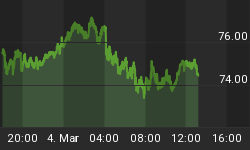The story from the Independent about Arab Gulf States & China looking for alternatives to the US dollar could be dismissed for now due to the lack of immediacy about its implementation. Neither such a story nor the immediate denial from Saudi Arabian officials is new. But the Arab Gulf State element certainly adds to the Chinese diversification element in highlighting the structural impediments of the US currency (zero interest rates at least into Q2 2010, budget deficit at 10% of GDP, tepid prospects of consumer-led recovery).
Only when China has attained the building blocks for currency convertibility (widening the band of the peg, become an invoice currency, reduce FX controls) would the notion of a reserve currency basket gain more credence. Thus, the next concrete step (that the USD should fear) is an outright revaluation of the yuan by the PBOC, as was done in July 2005.
Multicurrency Gold Look Today's golds surge to a new record high of $1,043 was a result of renewed concerns with the USD hegemony (Independent article), RBA rate hike and improved risk appetite. But while gold has hit a fresh record in USD terms, it remains more than 30% below its highs in AUD terms, 15% below its highs in JPY terms and only 6% below its highs in GBP terms. The top chart has the strongest advances, reflecting GBP secular weakness and increased chances that the metal gold would reach a new record against the pound. Considering the periodic bruising the pound obtains from the economic data, BoE, IMF and rating agencies, there remains ample room for broader losses, which may not necessarily be seen against USD.

Both AUD and JPY have consolidated against the shiny metal, thereby, highlighting their hefty advances in currency markets over the past 6 months. The steep decline in GOLD/AUD from its March highs illustrates the aggressive recovery of the Aussie (+85%, +40% vs. JPY and USD respectively from the Feb lows). Meanwhile, JPY did not show any sharp appreciation in gold terms (no sharp decline in GOLD/JPY chart) because the Japanese currency held up firmly throughout the crisis. And so with both AUD and JPY looking robust, which one will get the upper hand over the other? Heres our view on AUDJPY.
Sterling Rising to the Occasion of Disappointment Despite the deepening losses in the USD from the from the Independent story on the future of USD hegemony, the British pound manages be biggest loser of the day--underperforming even the USDafter the biggest monthly decline in manufacturing output in 7 months. Whether it is persistent reminders on prolonged QE by the BoE or dissipating second derivative economic data in the UK, sterling remains the path of least resistance to the bearsparticularly at times of risk aversion. Thus, any disappointment emerging from US earnings season should raise the risks of seeing $1.55 in GBPUSD and 0.94 in EURGBP.

RBA Move = Prelude to USD's Yield Deterioration The 25-bp rate hike from the Reserve Bank of Australia is a prelude to further USD yield inferiority, as other economies (Korea, Sweden, Norway, and New Zealand) are set to raise rates as early as Jan-Feb 2010, a prospect that would only exacerbate the outlook for the US dollar. A wave of rapid USD selling is inevitable once the ECB and BoJ start to give real signals (beyond mere rhetoric) for higher interest rates, especially if these are not matched by the Fed. Such would be the return to yield differentials, a losing race for the US currency. The opposite was seen in 2006, when the Fed stopped raising interest rates that summer, while every other major central bank continued its tightening cycle until summer 2008, accelerating the USD damage in 2006-08.

For more detail on the recurring topic of USD reserve status, Arab Gulf States currency concerns and the threat of diversification by central banks and sovereign wealth fund, check out Chapter 7 of my book on the topic.















